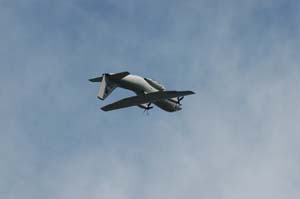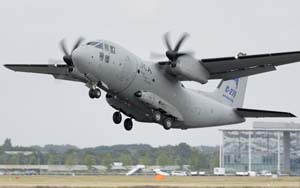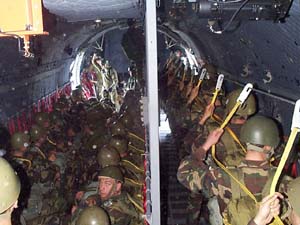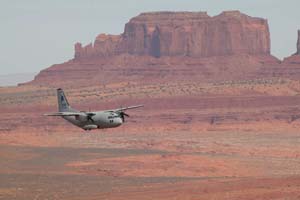More than a year ago, Secretary of Defense Robert M. Gates did two things with the C-27J Joint Cargo Aircraft program. First, he made it the exclusive property of the Air Force, all but eliminating the Army’s role in the program. Second, the Pentagon chief cut the planned procurement of the aircraft in half.
The decision turned plans for the program—and the direct-support airlift mission—on their head. Air Force officials are still working to transition the program and its mission to their sole purview while anticipating a smaller fleet.
The stakes are high. The airlifter is scheduled to make its initial deployment next March 2011, and the expected destination is Afghanistan.
The program, which began in 2005 as a joint Army and Air Force venture, has stirred some old service rivalries centered on the issue of the direct-support airlift mission. This has complicated the transfer of the C-27 to the Air Force.
Over the last year, Army and Air Force officials have worked to set up the Air Force program office at Aeronautical Systems Center at Wright-Patterson AFB, Ohio. It is scheduled to open this fall.
 |
|
Meanwhile, the joint program office at the Army’s Redstone Arsenal, Ala., is staying open until the end of this fiscal year to help with the transition.
“From an acquisition perspective, it’s really been seamless,” said Maj. Gen. Randal D. Fullhart, director of global reach in the Air Force’s acquisition office. “We clearly recognize the investment of time, knowledge, etc., that the joint program office had. So rather than simply stopping that and going on, we’ve really tried to drive a smooth transition, and to all measures, that’s gone very well.”
Proof of Concept
Still, the challenges in shepherding the urgently needed propeller-driven cargo airplanes—all of which will be fielded by the Air National Guard—are not just acquisition-related. The two services had to develop a concept of employment for the C-27J to guide how the Air Force will provide critical direct support airlift to Army ground forces operating in austere locations.
Late last year, officials set out to prove the concept of employment using surrogate C-130 airlifters dedicated to an Army combat aviation brigade deployed to Iraq. Both Army and Air Force officials have said they were overwhelmingly pleased with the results of the two-month battlefield test of the concept, stating it was a worthwhile exercise as the Air Force prepares to deploy the first C-27Js next year. The exercise “proved tremendously successful,” Lt. Gen. Robert P. Lennox, the Army’s deputy chief of staff for programs, told the House Armed Services Air and Land Forces Subcommittee March 10.
In all, the Air Force’s relationship with the Army on this issue “is probably a model for anything we do like this in the future because it really has been a partnership,” Fullhart said. “We wanted to make sure that in the transition, we did no harm, and I think we’ve been thoroughly successful in that.”
 |
|
The change has been felt on the Army side as well. During a breakfast with reporters March 31, Army Secretary John M. McHugh said he believes the changes to the program have put the Army and the Air Force on a “far more amicable path.”
“I’ve discussed this matter with [Air Force] Secretary [Michael B.] Donley, and I think we’re probably in a better place than perhaps the Army and Air Force were on this issue a year ago,” McHugh said.
Last spring, the C-27J became one of the lesser-known targets hit by the budget ax in the Pentagon’s Fiscal 2010 proposal. The $3 billion L-3 Communications/Alenia North America program did not have the visibility or the long-standing support on Capitol Hill as did other programs cut or terminated, such as the F-22 Raptor or the Army’s Future Combat Systems.
Nonetheless, the Pentagon’s decision to slash the C-27J buys from 78 aircraft to 38 and transfer all remaining aircraft to the Air Force shocked many in defense circles who had questioned the Air Force’s commitment to the program while at the same time for years hearing the Army’s urgent pleas for the aircraft. Under the original plan, the Army was to receive 54 C-27Js to replace aged C-23 Sherpas and help decrease the workload of the heavily deployed CH-47 Chinook helicopter fleet, which has logged record hours during operations in Iraq and Afghanistan. Lawmakers, however, had long questioned whether the Air Force, with its fleet of C-130s, actually wanted or needed the 24 airplanes it planned to buy.
In the Fiscal 2009 defense appropriations bill, Congress cut the Air Force’s request for advanced procurement funding, but USAF kept its portion of the program on ice by saving $16 million in research and development funding. Lawmakers supported the Army’s request that year to procure seven C-27Js.
However, shortly after announcing the decision to trim the buy of the aircraft and transfer them to the Air Force, Gates questioned the wisdom of buying 78 C-27Js to meet both Army and Air Force requirements, telling the House Armed Services Committee that the transport carries half the payload of a C-130 but costs two-thirds as much.
Platform-Neutral
Gates added that the C-27J, which had been hailed for its ability to land just about anywhere and go deep into the fight, would give the military access to only one percent more runways than a C-130 could. And with hundreds of C-130s not deployed overseas, the active and reserve components had adequate lift capability to respond to needs at home and overseas, he said. Attempting to assuage lawmakers concerned about the Air Force’s commitment to the direct-support mission, Gates also told House lawmakers that Air Force Chief of Staff Gen. Norton A. Schwartz and Army Chief of Staff Gen. George W. Casey Jr. were already discussing how the Air Force would respond to Army needs.
“And I think they are going to make considerable progress in that,” Gates said.
 |
|
To learn how to best and most efficiently deliver deployed Army forces’ time-sensitive, mission-critical equipment, supplies, and personnel into an area of operations, the Air Force convened a number of working groups comprising Air Force airlift experts, Army aviation experts, and representatives from US Transportation Command and US Central Command.
The result was the development of the platform-neutral concept of employment, which now serves as the doctrinal framework for deploying any aircraft—whether it is C-27Js, C-130s, or any other aircraft—in the direct-support airlift role. The plan gives the senior Army aviation authority tactical control of the Air Force’s deployed C-27Js, which will be embedded with Army combat aviation brigades. Members of the Ohio Air National Guard deployed with two C-130s to Iraq from October to December 2009 to mature the command and control structure and validate the direct-support requirements envisioned for the C-27J. (The two C-27Js in the Air Force inventory at the time were still undergoing testing Stateside.)
During concept testing, the Ohio Guard’s 164th Expeditionary Airlift Squadron was tasked by the Army’s 25th Combat Aviation Brigade. The squadron flew one aircraft daily, with the second on standby for immediate response, if necessary. “When the call came in, asking if we would support this mission, it took us about three seconds to answer,” Col. Gary McCue, commander of the Ohio Air National Guard’s 179th Operations Group, said last November. “As an Air Guard unit, we work very closely with the Army [National Guard] in Ohio. And since we rolled in here, it’s been seamless. The Army wants this to work. They’ve been asking for this for 60 years. And we’re showing them that we’re with them 100 percent.”
According to Fullhart, the exercise gave the Air Force a clearer understanding of how the Army’s requirements are generated and how the Air Force can be responsive to those needs. “I would say it’s really a confidence builder on both sides, both parties, to understand the mission, understand our ability to meet that mission, and for the Army to have the confidence that we, in fact, can deliver—which we did,” Fullhart said.
The Air Force Chief of Staff signaled to the House Armed Services Committee Feb. 23 that the concept of employment testing was successful in demonstrating the Air Force has “the command and control, the orientation, and the capacity to provide direct support, should that be what the joint force commander requires.”
Schwartz also signaled that the Air Force has reaffirmed to any doubters its commitment to the mission.
“I think the Army was intently interested in this [buying the C-27J] because they weren’t sure their Air Force would be there with them when they needed direct support,” Schwartz said. “That is a change. We have demonstrated to our Army brothers and sisters, as well as others, that we will be there. We can do this.”
Preparing for the Big Show
The Air Force was to begin multiservice operational test and evaluation on the C-27Js in April, in the hopes of wrapping up the test program by August and setting the airplanes up for initial operational capability, which is expected by October.
Ohio’s 179th Airlift Wing and the 175th Wing (a composite wing) at Martin State Arpt., Md., the first two Air Guard units to train and deploy with the new aircraft, will play a role in the multiservice operational test and evaluation, as will two Army National Guard units, Company H, 171st Aviation Regiment from Georgia, and 1st Battalion, 245th Airfield Operations, from Oklahoma. “Completing the test program in August is a big milestone for us because, at that point, we will be able to confirm the operational effectiveness and suitability of the weapon system,” said Brian Dougherty, a C-27J program analyst.
 |
|
All of the testing and evaluation is leading up to the big show—next year’s anticipated deployment of up to four C-27Js to Afghanistan. For the Army, which has been heavily tasking its Chinooks in the punishing Afghanistan terrain, the C-27J deployment can’t come soon enough. “I don’t think there’s a service Chief who wouldn’t like to see anything they desire deployed faster,” said McHugh, who served as the ranking member on the House Armed Services Committee before stepping down last year to take the Army post. “Is that a reasonable way forward at this point? It’s workable.”
First deliveries of aircraft to National Guard units are expected to begin in August or September, with crews getting mission qualified once the aircraft are delivered. At press time, the Air Force anticipated receiving the fourth C-27J into its inventory in April, with the last C-27J expected to be delivered in 2015.
The National Guard Bureau has plans to initially beddown the first 24 C-27Js at four other Air National Guard bases besides the ones in Maryland and Ohio: Hector Airport in Fargo, N.D.; Bradley Airport near Hartford, Conn.; W. K. Kellog Airport in Battle Creek, Mich.; and Key Field in Meridian, Miss.
For the remaining 14 aircraft, the NGB has developed criteria for basing options and is conducting site surveys and assessments of other potential operating locations. Once completed, it will provide recommendations to the Air Force’s Strategic Basing Executive Steering Group, which will forward recommendations to the SECAF’s office. A complete basing plan for all 38 aircraft is expected this fall.
Despite the progress on the program over the last year, some lawmakers are still not convinced the decision to transfer the program to the Air Force and cut the buys of the aircraft in half was the right one.
“I’m not sure the Air Force wants to be at the beck and call of the Army,” House Armed Services Air and Land Forces ranking member Roscoe G. Bartlett (R-Md.) said in a recent interview off the House floor.
Bartlett, who had repeatedly asked questions about the C-27 program during a series of hearings on the Fiscal 2011 budget, said he also remains concerned that despite the cuts to the program, the Army’s requirement for intratheater airlift has not changed since the JCA’s inception. Indeed, the Army’s Lennox told the Air and Land Forces panel March 10 he was not aware of any change in the requirement for C-27s.
Further Army Lift Requirements
Fullhart, however, said the Air Force believes 38 C-27Js is a “very reasonable number” and “will be sufficient in partnership with C-130 aircraft to fulfill the direct mission support needs of the Army.” McHugh signaled that the Army still has a requirement for additional lift, but is looking at ways to meet the near-term requirement through C-130s and other assets. Like Bartlett, Rep. Jim Marshall (D-Ga.) similarly questioned the Army’s requirement during the March 10 hearing, particularly as it relates to the Army’s direct-support needs. “I hope [the] Army is thinking about more than 38 in the future here, even if the Air Force happens to have the platform, you know, temporarily or permanently, because it seems to me the Army’s view is more than 38, based on all [the] Army has said thus far,” Marshall said.
Despite Bartlett’s strong support for expanding the C-27J program, the House-passed version of the Fiscal 2011 defense authorization bill, as well as the Senate Armed Services Committee’s bill, includes $351.2 million for eight C-27Js for the Air Force—matching the Obama Administration’s request. Other priorities, such as getting a handle on cost hikes and schedule delays on the F-35 strike fighter program, have “pushed everything else off the table,” Bartlett said prior to the bill’s passage.
Still, Bartlett said he wants to at least bring the issue to light and get straight answers from the Army and Air Force about their operational needs for these aircraft.
“I think these things are budget driven, rather than need driven—and I think that’s true about everything over there,” Bartlett said. “We’d like to know what the need is. And if we can’t get the money, we can’t get the money, but we’d like at least to know what the need is.”
Megan Scully is the defense reporter for National Journal’s CongressDaily in Washington, D.C., and a contributor to National Journal and Government Executive. Her most recent article for Air Force Magazine, “Getting on With the Neighbors,” appeared in the March issue.
